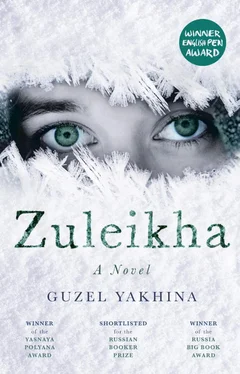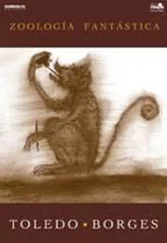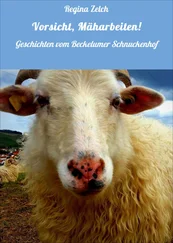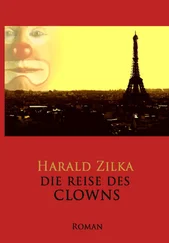The forest near Yulbash is good, bountiful. In the summer it feeds the villagers with large wild strawberries and sweet-beaded raspberries; there are pungent mushrooms in autumn. There is a lot of game. The Chishme flows from the forest’s depths, usually gentle, shallow, and filled with swift fish and sluggish crayfish, but it’s rapid, grumbling, and swollen with meltwater and mud in the spring. During the Great Famine, it was these alone – the forest and the river – that saved people. And Allah’s mercy, too, of course.
Murtaza has gone a long way today, almost to the end of the forest road. This road was built in the old days and leads through to the far border of the light part of the forest. It then extends into Last Clearing, which is surrounded by nine crooked pines, and breaks off. There is no further road. The forest ends and there begins the urman : dense evergreen woods, thickets broken by storms, and the abode of wild animals, forest spirits, and all kinds of evil. Centuries-old black spruce trees with sharp, spear-like tops grow so thickly in the urman that a horse cannot go through. And there are no pale-colored trees – red pines, speckled birch, or gray oak – whatsoever.
People say it’s possible to go to the lands of the Mari people by walking through the urman , away from the sun for many days in a row. But what person in his right mind would decide to undertake such a journey? The villagers didn’t even dare cross the border of Last Clearing during the time of the Great Famine. They nibbled at tree bark, ground acorns from the oaks, and dug up mouse burrows in search of grain, but they did not venture into the urman . The few who did were never seen again.
Zuleikha stops for a moment and places a large basket on the ground. She looks around anxiously – Murtaza really shouldn’t have gone this far.
“Is it much further, Murtaza? I can’t see Sandugach through the trees anymore.”
Her husband doesn’t answer; he’s up to his waist on the untrodden path, forging his way ahead, pushing his long poles into snowdrifts, and trampling brittle snow with his broad snowshoes. Small clouds of frosty steam puff up over his head. He finally stops near a tall, straight birch with a magnificent growth of chaga and approvingly slaps its trunk: This one .
First they trample down the snow around the tree. Then Murtaza tosses off his sheepskin coat, grabs the curved axe handle very firmly, points the axe at the gap between trees ( we’ll fell it there ), and begins chopping.
The blade glints in the sun and enters the side of the birch with a short, resonant chakh sound. “ Akh! Akh! ” answers the echo. The axe chops at the thick bark, intricately engraved all over with black ridges, then pierces the pale-pink woody pulp. Wood chips spatter like tears. An echo fills the forest.
It can be heard in the urman, too , Zuleikha thinks, uneasy. She’s standing waist-deep in snow a little further away, clasping the basket, and watching Murtaza chop. He raises the axe high, pulling it back slightly, supplely bends his torso, and smoothly swings the blade into the white chip-filled crevice on the side of the tree. He’s a strong man, large. And he works ably. She was given a good husband; complaining would be a sin. She herself is small, barely coming up to Murtaza’s shoulder.
Soon the birch begins shuddering more and groaning louder. The axe wound in its trunk resembles a mouth wide open in a silent scream. Murtaza tosses the axe, shakes the twigs from his shoulders, and nods at Zuleikha: Help me . Together they press their shoulders into the rough tree trunk and push, harder and harder. There’s a sharp cracking noise and the birch collapses to the ground with a loud groan of farewell, raising a cloud of snowy dust into the air.
Husband straddles the conquered tree and lops off its fat branches. Wife snaps off the thin branches and collects them in the basket, along with smaller kindling. They work silently for a long time. Zuleikha’s lower back aches; exhaustion weighs on her shoulders. Her hands are freezing despite her mittens.
“Murtaza, is it true that in her youth your mother went into the urman for several days and came back all in one piece?” Zuleikha straightens her back and bends at the waist, resting. “The holy man’s wife told me about it, and she heard it from her granny.”
He doesn’t answer; he’s measuring the axe against a gnarled, crooked branch sticking out from the trunk.
“I’d die of fear if I ended up there. My legs would probably stop working right away. I’d be lying on the ground, my eyes shut tight, and praying nonstop, as long as my tongue would move.”
Murtaza strikes hard and the branch springs off to the side, humming and quivering.
“But they say prayers don’t work in the urman . It’s all the same – you die whether you pray or not. What do you think?” Zuleikha lowers her voice. “Are there places on earth that Allah’s gaze doesn’t reach?”
Murtaza draws his arms far back and drives the axe deeply into a log. The sound rings in the cold air. He takes off his shaggy fur hat, wipes his reddened, blazing, bare skull with his hand, and spits on the ground, savoring it.
He sets to work again.
The basket is soon full. It can’t be lifted so it can only be dragged away. The birch has been stripped of branches and chopped into several logs. Long branches lie in neat bundles in the snowdrifts around them.
They haven’t noticed darkness is falling. When Zuleikha looks up at the sky, the sun is already hidden behind ragged shreds of cloud. A gust swoops in; the drifting snow whistles and swirls.
“Let’s go home, Murtaza; it’s getting stormy again.”
Her husband doesn’t answer as he continues winding rope around fat bunches of firewood. When the last bundle is ready, the storm is already starting to howl between the trees like a wolf, drawn-out and mean.
He points a fur mitten at the logs: Let’s move those first . There are four logs with the stubs of their former branches, each longer than Zuleikha. Grunting, Murtaza heaves one end of the fattest log from the ground. Zuleikha takes the other end. She can’t manage to lift it immediately and dawdles for a while, adjusting her position.
“Come on, woman!” Murtaza cries out impatiently.
Finally, she’s done it. She’s embracing the log with both arms, pressing her chest into the pink-tinged whiteness of fresh wood that’s bristling with long, sharp chips. They’re moving toward the sledge. They walk slowly. Her arms shake. I cannot drop it, Almighty, I cannot drop it . If it fell on her foot, she’d be a cripple for the rest of her life. It’s getting hot and there are warm little streams running down her back and belly. The precious band under her breasts is soaked through – the pastila will taste of salt. That doesn’t matter, she just needs to take it today…
Sandugach is standing obediently in the same place, lazily shifting from hoof to hoof. There aren’t many wolves this winter; Allah is perfect , so Murtaza isn’t worried about leaving the horse alone for a long time.
Once they’ve dragged the log onto the sledge, Zuleikha falls alongside it, tossing off her mittens and loosening the shawl around her neck. It hurts to breathe; it’s as if she’s run through the entire village without stopping.
Murtaza strides back to the firewood without saying a word. Zuleikha crawls down from the sledge and trails along behind him. They drag over the remaining logs. Then the bundles of fat branches. Then the thin branches.
Once the firewood has been stacked on the sledge, a heavy winter dusk is already covering the forest. Only Zuleikha’s basket remains by the freshly hewn birch stump.
Читать дальше

![Тимур Айтбаев - Вы призвали не того... Книга 4 (Оскал Тьмы ) [Сетевое издание zelluloza.ru]](/books/34353/timur-ajtbaev-vy-prizvali-ne-togo-kniga-4-oska-thumb.webp)










